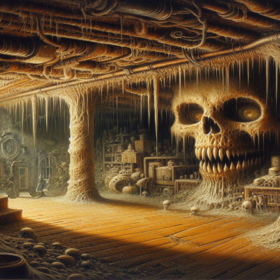A relatively new entry in scriptwriting jargon owes its secret origin to notoriously uncooperative movie star Bruce Willis. Kevin Smith recalls the moment, during their unfruitful collaboration on fore-doomed project Cop Out, when Willis started ripping out pages of dialogue he deemed irrelevant to the main action. This was chuffa, Willis said, and he wasn’t going to bother to shoot it.
Mindy Kaling defines chuffa as dialogue that expresses an amusing attitude without rising to the level of actual funny joke:
“Chuffa is filler that seems like it’s funny but isn’t really a joke. It’s just kind of an attitude. I watch Entourage and Weeds, but they have a lot of chuffa. I don’t mean to denigrate them, but I don’t think I’ve laughed once watching them. 30 Rock and Arrested Development are anti-chuffa.”
Aziz Ansari puts a positive spin on chuffa in his moving tribute to the late writer and comic Harris Wittels, who he describes as a master of genuinely funny chuffa:
Chuffah is the random nonsense characters in a scene talk about before getting to the meat of it that leads to story.
Roleplaying scenes can have chuffa in them too. Even in a deep old school F20 game, the banter you have with the blacksmith before he sells you armor could be considered chuffa. If it entertains, it’s the Harris Wittels variety. If not, it’s the Bruce Willis kind. Except that roleplaying is always the first and last draft, and there’s no movie star to rip boring pages out of a script. Or script for him to rip out of, for that matter.
In DramaSystem players often want to nibble around the edges of a scene with small talk and banter before the petitioner reveals to the granter what she wants from him. This follows the emotional dynamic of real life. We don’t immediately launch into a difficult request as soon as we encounter the person we want something from. We hedge, we distract, we beat around the bush, and we wait for our moment. But unlike real interactions, you do need to keep the attention spans of the rest of the group in mind. Players don’t expect the ruthless editing an episode of The Office would get, but attention will wander if a scene doesn’t get to the point.
It may surprise you to learn that the people of our great nerdtribe are sometimes prone to digression. Two participants in a scene may happily spin surface minutiae until the cows come home, with nary a petition in sight.
This is one of the main reasons why DramaSystem uses a GM: to keep an ear cocked for excessive chuffa. When as GM you sense that the scene has lost the rest of the room by failing to reach the point, gently intervene and suggest that the players move it along.
My response to overlong chuffa is usually to say, “Raise the stakes.” You may prefer another term, but whatever you say, your players will be grateful for your help in keeping scenes trim—by tabletop standards, at least.
Hillfolk is a game of high-stakes interpersonal conflict by acclaimed designer Robin D. Laws. Using its DramaSystem rules, you and your friends can weave enthralling sagas of Iron Age tribes, Regency socialites, border town drug kingpins, a troubled crime family, posthuman cyberpunks and more. Purchase Hillfolk and its companion Blood in the Snow in print and PDF at the Pelgrane Shop.



